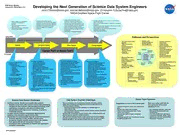Table Of ContentESIP Winter Meeting
Developing the Next Generation of Science Data System Engineers
January 6-8, Washington, D.C.
[email protected], [email protected], [email protected]
NASA/Goddard Space Flight Center
• Leads technical activities of inter-
• Oversees development for a mission or multi-mission
• Develops and operates specific
disciplinary engineers developing an
• Works in-depth on a data system
science data system
components of an instrument data system
instrument or data system component
component development or
• Plans and administers projects of national or international
• Integrates and tests instrument algorithms
• Oversees data center development, tracts
operation
importance
• Manages mission science data collections
costs and schedule, technical constraints
• Serves with specific science or
• Establishes long-range agendas for development of large
• Participates in professional societies
• Leads standards development efforts
instrument team
new unusually complex systems
• Works on collaborative US agency
• Serves as instructor on data management
• Offers cross-training in science and
• Responsible for resource requirements, policies,
programs
• Serves as NASA representative to other
computer technologies
procedures and budgets
US Agencies
• Leads International projects
• Participates in International projects
Duties/Skills
Pathways and Perspectives
Very often our candidates have been contractors
• Strategic vision
• Instrument Software Data • Customer Orientation
• Change Management
Systems • Decisiveness
• Risk Management
• Flight & Ground Data • Problem Solving
Engineer Journeyman Engineer • External Awareness
Senior Engineer Principal Engineer Systems • Quality Principles
• Systems Engineering • Resource Management &
• Data & Information Stewardship
Management • Technology Management
Strategic
Career Path at NASA/GSFC
• Systems Thinking Outcome • Creativity & Innovation
• Integration Oriented • Results Orientation
Know-
• Collaboration • Process Oversight
ledge
Knowledge
Careers Management
Super-
encompass • Program Development,
visor/
more than Planning & Evaluation
• Mission & Organization Team
technical
Awareness
Mission
knowledge
• Goals, Strategy & Policy
• Thorough knowledge of software
• Thorough knowledge of: • Software Standards
• Thorough knowledge of:
Inter-
• Coaching/Counseling/Mentoring
engineering design and development
• Looking for degrees in the Science Data structures Adherence
• Software engineering design and
Personal personal
• Team Building
methodologies, paradigms, tools
following areas: Programming languages e.g. CMMI
development methodologies
Mastery
• Conflict Management
• Sufficient to conceive, apply
Physical Sciences Operating systems • Discipline Standards
• Agency information processing
• Human Resources Management
experimental theories to resolve unique
Astronomy, Astrophysics Applications techniques Awareness e.g. CCSDS,
policies and standards
• Diversity Awareness
or novel problems, significantly alter
Geology Service oriented architectures ISO19115, HDF
• Science data system architectures,
• Situational Leadership
standard practices
Hydrology Off-the-shelf and opens source software
science data storage, data formats,
• Knows agency information processing
Meteorology (e.g., RDMS, GIS)
science metadata
standards and policies
Oceanography Hardware systems
• Recognized Subject Matter Expert
• Knows software engineering lifecycle • Self-direction • Interpersonal skills
Physics • Knows science and engineering concepts, • Attention to
• Science Domain
• Focus on particular domain to become • Reasoning • Oral/Written Communication
Computer Engineering practices: Detail
• Data Center systems and operations
expert • Resilience • Influencing/Negotiating
Computer Science Levels of processed data (0, 1, 2…) • Technical
• Data Management
• Software data storage • Flexibility • Partnering/Teaming
Orbital mechanics, instruments Competence
• Data Manipulation and Services
• Science Data formats • Ethics/Professionalis • Political Savvy
• But the following fields of Map projections (Lat/lon, RA/DEC) • Core Values
• Extensive understanding of instrument
• Science metadata m • Presentation/Marketing Skills
expertise are also useful: Instrument calibration • Self-Esteem
and physical science discipline data
• Data Management Expert • Honesty/Loyalty • Organizational Representation
Remote Sensing techniques/algorithms
formats, analytical methods,
• Has experience with NASA science data • Continual Learning & Liaison
Mathematics Validation techniques
computations science
and understand provenance issues, • Working within a Team
Physical geography Physical science algorithms, modeling
• Extends discipline knowledge boundary
data quality
Human geography systems, Geographic Information Systems
• Project Management expertise
Standard data formats (CCSDS, HDF, CDF,
FITs)
Knows how to integrate new technologies into
current systems
Career Track Guidance
Data System Engineer Challenges
Science Data System Challenges
• Architect smarter, flexible and scalable data systems: • Play an increasing role in developing metadata and data products. Seek out a career path that fits
Suggestions on how to find a career path:
• Adapt data processing and integration of science algorithms to an
• Simplify components with common science data processing your goals and will be most
evolving computer industry.
functions to ease evolution with emerging technology while • Develop a long-term vision with a short term satisfying to you:
• Depicting discipline specific attributes for multiple types of
maintaining connectivity with archival science data. plan.
observational data
• Review your career plan annually. • Your individual interests, skills, and
• Standardized public data access interfaces of central &
• Utilize attributes that can become common across science disciplines
• Listen to what others have done. Find a training will dictate the path you
distributed sources.
and observation systems
mentor, be a mentor. should follow.
• Increase science findings and practical applications by
• Working with increasingly complex science data, multiple datasets and
• Improve your skills through continuing • Over time, modify your path based
enabling cross-discipline use of science data. diverse sources requires a skilled workforce
education. on personal interests, values, goals,
• Take technical training focused in data science and new technologies
• Standardize the fundamentally required content and structure:
• Challenge yourself, don’t be afraid to change, experiences, and new opportunities
• Develop next generation science data systems that can serve multiple
• Common depiction of time, location and accuracy. be willing to take a risk. that present themselves.
science disciplines, diverse observational data and model output.
• Increasing complex remotes sensors and in-situ sensors
from spacecraft, aircraft and surface networks.
• Encompass data complexities of research and application
discipline communities.
www.nasa.gov

